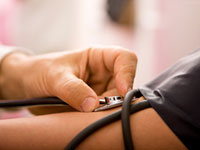Weight Loss After Gastric Band Surgery Can Improve Stress Incontinence in Women
Being obese is a risk factor for a common, yet embarrassing, condition called stress urinary incontinence. Weight loss after laparoscopic gastric banding surgery can help, especially in women.
Stress incontinence is an involuntary loss of urine that occurs during physical activity or a sudden movement such as during coughing or sneezing. The ability to hold urine and control urination depends on the normal function of the lower urinary tract, the kidneys, and the nervous system. For those with incontinence, the sphincter muscle and the pelvic muscles, which support the bladder and urethra, are weakened and unable to prevent urine flow when there is increased pressure from the abdomen.
Read: Urinary Incontinence in Women Improved with Weight Loss
Obesity contributes to urinary incontinence because fat in the abdominal region puts pressure on the bladder. The severity of incontinence often increases as BMI increases.
Weranja KB Ranasinghe MBBS, of Austin Hospital in Melbourne, Australia, and colleagues studied 142 women (average age 48) and 34 men (average age 53) who had undergone gastric banding surgery between January 2001 and 2009.
The participants were questioned about urinary function and, in men, erectile dysfunction using three evaluative questionnaires.
Prior to gastric banding, 65 percent of women and 24 percent of men had urinary incontinence. 83.3 percent of the men experienced erectile dysfunction. After bariatric surgery, the men and women lost about 50 pounds.
Read: Obesity Tied to Poorer Sexual Health, Exercise Can Help
Overall, the women reported an improvement to symptoms of stress incontinence. Men, however, did not show the same results even with postoperative weight loss.
Erectile dysfunction in men also did not improve after gastric banding surgery and, in some, worsened. But this may be because there were so few men in the study, making it harder to generalize the results. Also, says Ranasinghe, improvements may take time. Weight loss can lead to an improvement in blood vessels and blood flow, possibly reducing erectile dysfunction.
"More prospective studies involving urodynamic evaluation are needed to investigate the effects of bariatric surgery on urinary and sexual function in males and females in depth," the authors write.
Source: British Journal of Urology International
-
How To Lose Weight Quickly
There are only a few way to lose massive amounts of weight quickly. Th
-
Want to have a smooth way towards healthy living?
Have you ever noticed unbalanced shape of your belly? If yes and
-
Dieting for a Quicker Way to Lose Weight-Discover How Easy It Can Be
When dieting for weight loss one of the
-
Eat Like a Greek God and Lose Weight
There was a region unknown to a major part of the world, where people
-
Ideal Dieting With Weight Loss Pills
With all the weight loss treatments that appear on the market, it is r
-
What To Do When You Want To Lose Weight
You must keep an open mind when it comes to weight loss advice.
- DON'T MISS
- The Japanese Diet A Diet To Lose Weight Remain Slim Be Healthy
- 5 reasons to eat more peanut butter
- Rheumatoid arthritis vs. osteoarthritis, differences in symptoms, causes, and treatment
- La La Anthony: Still In The Game & Winning
- Weight Loss
- Weight Loss The Sleep Prescription
- Can Specific Proteins and Carbs Keep Weight Off?
- Does The Skin Tighten After Liposuction
- All About Compulsive & Emotional Eating
- Fat Burning Furnace Reviewed and Dissected




